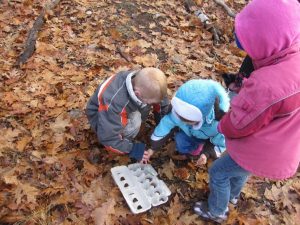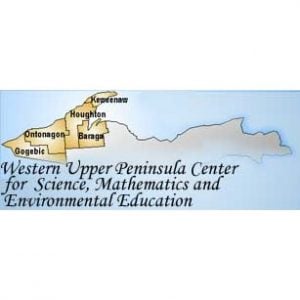 Using the outdoors as a classroom is a great way to get students excited about science and make connections to the real world!
Using the outdoors as a classroom is a great way to get students excited about science and make connections to the real world!
Since 2001, the Western Upper Peninsula Center for Science, Math & Environmental Education, in partnership with the Center for Science & Environmental Outreach at Michigan Technological University, offers outdoor learning experiences in science and environmental education for K-12 students in the five western counties of the Upper Peninsula.
Field trip activities enhance classroom learning and are correlated to Michigan Grade Level Content Expectations for Science and Math.. During the activities, students utilize many science and math skills such as observing, predicting, data collecting, recording, graphing, analyzing and drawing conclusions.
REGISTER NOW
Teachers should complete a Field Trip Request Form online. On the form, select a program, several dates, and a
location. Your school is encouraged to schedule multiple field trips on the same day for different classes at different
times. After we receive your request form, we will schedule your field trip and send you a confirmation letter.
Field trips are available to schools in the CCISD and GOISD school districts.
Cost: The field trips are $30 per class (up to 30 students). The CCISD will invoice each school at the end of
the season for the total number of field trips provided for each school during that season.
Program Descriptions
Pre-K & Kindergarten
Sense Detectives Duration: ½ hour-1hour
By listening carefully and looking closely, students use their senses to interpret the world around them as they discover the living and nonliving parts of the forest. After identifying what all living things need to survive, students will search the forest for some of these needs. Michigan GLEC’s: SCI: S.IP.00.11-14; S.IA.00.12-14; L.OL.00.11-12
Wildlife Is Everywhere! Duration: ½ hour-1hour
Students will make observations and conclude that wildlife is all around us. Next, they will compare the lives of wild and tame animals; and search the forest for the needs of wild animals. Michigan GLEC’s: SCI: S.IP.00.11-14, S.IA.00.12-14, L.OL.00.11-12., SE.SE.00.11
GRADE 1
Bird Migration Duration: 1-1.5 hours
Students will examine the questions: Why do birds migrate? What are some of the challenges they face during migration? How are birds alike or different? Michigan GLEC’s: SCI: S.IP.01.11-12,14; S.IA.01.12-14; L.OL.01.13,21;L.HE.01.11-12
Weather Forecast Duration: 1-1.5 hours
Students will be introduced to different tools used to measure weather. They will observe and record the temperature, cloud cover, precipitation and wind. They will investigate ways plants and animals have adapted to different types of weather. Michigan GLEC’s: SCI: S.IP.01.11-12,14; L.OL.01.13; E.ES.01.11-12, E.ES.01.21-24; E.ES.01.31-32
GRADE 2
To Be a Tree and Seed Get-Aways Duration: 1-1.5 hours
Students will investigate trees, focusing on what plants need to survive. They will describe the life cycle of familiar plants and compare the leaves and seeds of different trees. They will also participate in a scavenger hunt identify the different methods of seed dispersal. Michigan GLEC’s: SCI: S.IP.02.11-12,14; S.IA.02.1-14; L.OL.02.14,22 L.HE.02.13
Soil Detectives Duration: 1-1.5 hours
Students will use sieves to investigate soil and determine what soil is made of. They will discover that there are many types, colors and textures of soil and conduct a mini-experiment to understand how erosion affects soil types differently. Michigan GLEC’s: S.IP.02.11, S.IP.02.12, S.IP.02.13, S.IP.02.14, P.PM.02.14, E.FE.02.21
GRADE 3
Have to Have Habitat & Adaptations for Survival Duration: 1-1.5 hours
Students will observe some of the unique structures and functions of organisms, investigate how plants and animals are adapted to their environments, and participate in multiple activities. Michigan GLEC’s: SCI: S.IP.03.11-15; S.IA.03.11-15; S.RS.03.18; E.ES.03.52.
The Physics of Flight Duration: 1-1.5 hours
Birds come in all shapes and sizes—ever wonder why? Students will explore bird feathers, wings and flight as they investigate the forces of lift and thrust, then conduct an experiment to see how mass and force are related. Michigan GLEC’s: S.IP.03.1, P.FM.E.2, P.FM.E.3
GRADE 4
Wildlife Signs and Survival Duration: 1-1.5 hours
Students will go on a scavenger hunt to look for signs of wildlife. Through two activities, “Oh Deer!” & “How Many Bears?”, students will investigate factors influencing organisms’ survival and population growth. Michigan GLEC’s: SCI: S.IP.04.11-14; S.IA.04.12-14; S.RS.04.15,18; L.OL.04.16.L.EV.04.21-22.
Spiders & Insects Duration: 1-1.5 hours
How are spiders different from insects? How are they similar? The students will learn about different types of spiders and insects while searching for webs, egg cases and other evidence. They will carefully record and analyze the data collected. Students will not handle spiders or insects. Michigan GLEC’s: SCIS.IP.04.11-14; S.IA.04.12-14; S.RS.04.15,18; L.OL.04.16. L.EV.04.21-22; L.EC.04.11.21.
GRADE 5
Tree Identification Duration: 1-1.5 hours
Using guidebooks and dichotomous keys, students will use observations of leaves, buds, bark, tree silhouettes, and branch patterns to help identify native trees species. Students will also be introduced to measurement of tree height and diameter. Michigan GLEC’s: SCI: S.IP.05.11-16; S.IA.05.11-15; L.EV.05.12; L.EV.05.21
Aquatic Macroinvertebrate Stream Study Duration: 1.5-2 hours
Students will collect, identify and inventory aquatic macroinvertebrates in one of our local streams. They will examine the organism’s role in the food chain and as indicators of water quality in the environment. Michigan GLEC’s: SCI: S.IP.05.11-16; S.IA.05.11-13; L.EV.05.11-12.
GRADE 6
Fabulous Fungi Duration: 1-1.5 hours
Students will learn what a fungus is and about its role as a decomposer is in the forest ecosystem. We will hunt for the fruiting bodies (mushrooms) of fungi and classify what we find according to the nine major divisions of mushrooms. Michigan GLEC’s: S.IP.06.11-16; S.IA.06.11-13; L.OL.06.51-52. L.EC.06.22-23.
Magnetic Earth-Compasses & Orienteering Duration: 1.5-2 hours
Students will learn how to use a compass and in the process understand that the reason compasses work is because of earth’s magnetic field. They will also complete a mini-orienteering course to test their compass reading skills. Michigan GLEC’s: E.SE.M.6, E.SE.06.62
GRADES 7-8
Possible topics include:
Aquatic Macroinvertebrate Stream Study
Bog and Wetland Ecology
Fungi and Decomposition
Tree ID
Wildlife Signs and Survival
Possible Locations for Fall Field Trips:
- Baraga School Forest
- Bessemer City Park
- Black Creek Nature Sanctuary
- Calumet Waterworks Park
- Calumet Lions Park
- Ford Forestry Center
- Lake Linden-Hubbell School Forest
- Maasto-Hiito Trails
- McLain State Park
- Michigan Tech Trails
- Nara Nature Center
- Norrie Park
- Paavola Wetlands
- Your school
- Suggest a site!
Cancellation Policy: the Center will not cancel any field trips due to weather, it is the responsibility of the teacher to
decide if a field trip should be cancelled. To cancel a field trip, please call the Field Trip Coordinator at (906)
370-1052 at least 2 hours in advance (3 hours for Gogebic/Ontonagon schools).
For more information, contact:
Brian Doughty, Field Trip Coordinator
Email: bwdoughty@mtu.edu
Phone: 906-487-3341 (office) or 248-798-4382 (cell)
The Western U.P. Center for Science, Mathematics & Environmental Education is a partnership of Copper Country & Gogebic-Ontonagon
Intermediate School Districts and the Michigan Tech Center for Science & Environmental Outreach serving schools and communities in
Houghton, Baraga, Gogebic, Ontonagon and Keweenaw Counties. The Center’s mission is to enhance the teaching and learning of Science,
Technology, Engineering, and Math (STEM).
Field Trip Financial Support
The Outdoor Science Investigation Field Trip Program has been funded since 2008 with a grant from the Wege Foundation to Michigan Tech.
In 2012 and 2015, snowshoes were purchased with support from the Keweenaw Community Foundation and the MEEMIC Foundation,
respectively. In 2016, another grant from the Keweenaw Community Foundation is funding technology to support outdoor investigations.
The field trip program is coordinated by the Michigan Tech’s Center for Science and Environmental Outreach and the Western UP Center for Science, Math and Environmental Education. It is funded in part by the Michigan Stem Partnership and the Wege Foundation.


